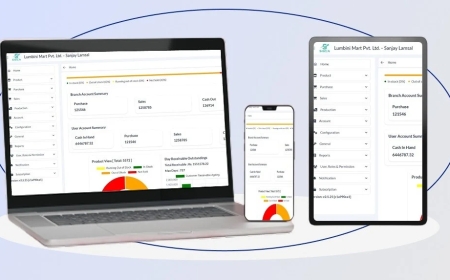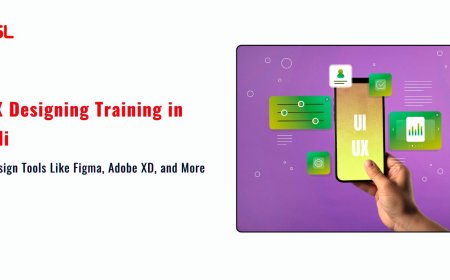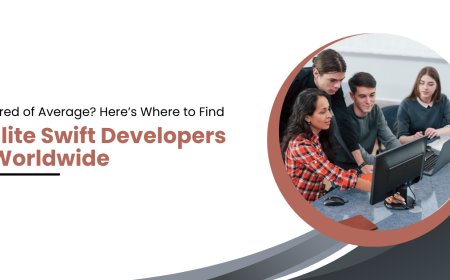How Healthcare Software Development Services Improve Data Security?
Learn how healthcare software development services improve data security with strong encryption, secure workflows, and compliance with industry standards.

In today's digital age, healthcare is becoming increasingly dependent on technology to deliver quality patient care. From electronic health records to telemedicine, software plays a crucial role in managing sensitive healthcare data. However, with this growing reliance on digital systems comes the pressing concern of data security. Healthcare data is among the most sensitive personal information, and protecting it from breaches and unauthorized access is critical. This is where healthcare software development services come in. They are designed not only to create efficient healthcare applications but also to ensure the safety and privacy of patient data.
The Importance of Data Security in Healthcare
Healthcare organizations handle massive amounts of patient data every day. This includes personal details, medical history, prescriptions, billing information, and much more. Such data, if exposed or mishandled, can lead to serious consequences including identity theft, financial loss, and damage to patient trust. Furthermore, healthcare providers are bound by strict regulations such as HIPAA (Health Insurance Portability and Accountability Act) in the United States, which mandates strict guidelines on protecting patient information.
Data breaches in healthcare have become alarmingly common in recent years. Cybercriminals target healthcare systems because the data they contain is highly valuable on the black market. A single breach can cost organizations millions in penalties and damage their reputation permanently.
Therefore, healthcare software must be built with strong security measures embedded from the ground up. This is where specialized healthcare software development services bring their expertise to the table.
How Healthcare Software Development Services Address Data Security
Understanding Compliance and Regulatory Requirements
One of the first steps healthcare software developers take is understanding the various laws and regulations that govern healthcare data security. This includes HIPAA in the U.S., GDPR in Europe, and other local laws depending on the region. Complying with these regulations ensures that the software has built-in protections to keep data private and secure.
Developers build systems with encryption, secure access controls, audit trails, and other features that meet these legal requirements. This approach minimizes the risk of costly penalties and helps maintain patient trust.
Building Secure Architecture
Healthcare software development companies design the software architecture with security as a priority. This means they implement multiple layers of security controls to protect sensitive data. For example, data encryption is used both for storing information (at rest) and when it is being sent over networks (in transit). This way, even if data is intercepted, it cannot be read without the encryption keys.
Developers also use secure coding practices to avoid vulnerabilities such as SQL injections, cross-site scripting (XSS), and buffer overflows that hackers exploit to gain unauthorized access.
Implementing Role-Based Access Control (RBAC)
Not everyone in a healthcare organization should have access to all patient data. Healthcare software development services implement role-based access controls, which means users can only access the information necessary for their job. For instance, a nurse may see certain medical records, but billing details are only accessible to the finance department.
This limits the exposure of sensitive data and reduces the chances of accidental or malicious misuse.
Regular Security Testing and Audits
Building software with security features is just the beginning. Healthcare software development companies also conduct regular security testing, including penetration testing and vulnerability assessments. These tests simulate cyberattacks to identify weak points in the system before hackers can exploit them.
Audits help ensure that the software continuously meets security standards, especially as new threats emerge and the system evolves.
Integration with Secure Cloud Services
Many healthcare applications today are cloud-based to provide scalability and accessibility. Healthcare software development services often partner with secure cloud providers that comply with healthcare regulations. They use advanced security features like multi-factor authentication, data encryption, and continuous monitoring offered by these cloud platforms.
Cloud integration also enables secure backups and disaster recovery options, ensuring data is safe even in the event of hardware failure or cyberattacks.
The Role of Advanced Technologies in Healthcare Data Security
Artificial Intelligence and Machine Learning
AI and machine learning are playing a growing role in healthcare security. Software development services integrate AI-based tools that monitor network traffic and user behavior to detect unusual activities. These tools can alert administrators to potential breaches or insider threats in real-time, allowing for quick response.
Machine learning algorithms can also help in identifying vulnerabilities and suggesting security improvements by analyzing patterns over time.
Blockchain Technology
Blockchain offers a decentralized and tamper-proof way of storing healthcare data. Some healthcare software developers are exploring blockchain to improve data security and transparency. Blockchain ensures that records cannot be altered without proper authorization, providing an immutable audit trail.
This technology can also give patients more control over their data by allowing them to grant or revoke access permissions easily.
Secure APIs for Interoperability
Healthcare software must often interact with other systems like labs, pharmacies, insurance providers, and government databases. Developers create secure APIs (Application Programming Interfaces) that allow these systems to communicate safely.
By enforcing strict authentication and data encryption on APIs, software developers prevent data leaks during these interactions.
Benefits of Using Professional Healthcare Software Development Services for Data Security
Choosing a specialized healthcare software development company offers several advantages:
- Expert Knowledge: These companies understand the complexities of healthcare regulations and the unique security challenges in this sector.
- Customized Solutions: They tailor security measures to fit the specific needs of your organization, rather than using one-size-fits-all software.
- Ongoing Support: They provide regular updates, patches, and monitoring to keep security strong over time.
- Risk Reduction: By designing software with security from the start, they reduce the risk of breaches and costly penalties.
- Patient Trust: Secure software helps build confidence among patients that their sensitive information is safe.
Common Challenges in Healthcare Data Security and How Software Development Addresses Them
Managing Legacy Systems
Many healthcare organizations still use outdated systems that are vulnerable to attacks. Healthcare software development services help by creating modern applications that can integrate with or replace legacy systems while maintaining security.
Human Error
Even with the best software, human mistakes can lead to data leaks. Developers create user-friendly interfaces with built-in checks and prompts to minimize errors. They also integrate training modules to educate staff on best security practices.
Rapidly Evolving Threats
Cyber threats constantly change, making it hard to keep up. Healthcare software companies stay updated with the latest security trends and update software accordingly to defend against new types of attacks.
Read more: How Healthcare Software Development Consultation Improves Data Security?
Conclusion
Healthcare software development services are vital in protecting patient data and ensuring compliance with strict regulations. By focusing on secure architecture, encryption, access control, and regular testing, these services build strong defenses against cyber threats. They also leverage emerging technologies like AI and blockchain to enhance security further.
With the healthcare industry increasingly adopting digital solutions, partnering with a trusted healthcare software development company becomes essential. They bring specialized expertise that not only improves operational efficiency but also safeguards the most sensitive information.
As data breaches in healthcare continue to rise, investing in robust software development that prioritizes security is no longer optionalit is a necessity. This careful attention to security also builds trust between patients and providers, which is crucial for delivering quality care.
If you are looking to develop secure healthcare software, consider working with a reliable clone app development company. They understand how to blend innovation with security, helping your organization meet regulatory standards and protect valuable patient data effectively.
FAQs
What makes healthcare software development different from regular software development?
Healthcare software must comply with strict data privacy laws and include strong security features to protect sensitive patient information. It also often needs to integrate with various medical devices and systems, which requires specialized knowledge.
How do healthcare software companies ensure compliance with regulations?
They incorporate regulatory requirements like HIPAA and GDPR into the software design. This includes secure data storage, encrypted communication, audit trails, and strict user access controls.
Can healthcare software prevent all data breaches?
While no system can guarantee 100% protection, well-developed healthcare software significantly reduces risks by implementing multiple security layers, regular testing, and monitoring to catch threats early.
How often should healthcare software be updated for security?
Healthcare software should be regularly updated with security patches and improvements. Many companies recommend continuous monitoring and frequent updates to respond quickly to new vulnerabilities.
What role does patient consent play in healthcare data security?
Patient consent is crucial. Healthcare software often includes features that allow patients to control who can access their data, ensuring transparency and compliance with privacy laws.





























